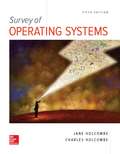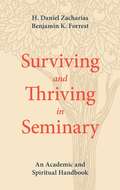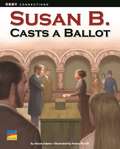- Table View
- List View
Survey of Historic Costume
by Phyllis G. Tortora Sara B. MarckettiLearn about Western dress from the ancient world to today. Each chapter shows you the social, cross-cultural, environmental, geographic, and artistic influences on what people wore. More than 600 images help you to recognize recurring themes and concepts and understand the role of dress from a diverse, global perspective. <p><p>The book covers each decade, from the 1920s to the present, in separate chapters to help you keep track of the changes in modern fashion. Learning Objectives, Key Terms, Discussion Questions and Exercises, and a Glossary help you master concepts.
Survey of Operating Systems (Fifth Edition)
by Charles Holcombe Jane HolcombeInformation technology (IT) offers many career paths, leading to occupations in such fields as PC repair, network administration, telecommunications, Web development, graphic design, and desktop support. To become competent in any IT field, however, you need certain basic computer skills. This book will help you build a foundation for success in the IT field by introducing you to fundamental information about desktop operating systems, a needed basis for working with computers at any level.
Survival at Plymouth; A Helping Hand in New Amsterdam
by Stacia Deutsch Rhody Cohon Helen PavlacWilliam Bradford, leader of the Plymouth Community, is sick. How will his teenage son John save his life? Young Anna gives some of her vegetables to a struggling couple right off the boat from Holland. How will her kindness be repaid?
Survival at Plymouth; A Helping Hand in New Amsterdam, Bridges Edition
by Stacia Deutsch Rhody Cohon Helen PavlacWilliam Bradford, leader of the Plymouth Community, is sick. How will his teenage son John save his life? Young Anna gives some of her vegetables to a struggling couple right off the boat from Holland. How will her kindness be repaid?
Survival in the Forest (Fountas & Pinnell Classroom, Guided Reading Grade 6)
by Shirley DukeTHE BIELSKI BROTHERS In a small village in eastern Europe, the Bielski family worked hard in their mill and lived off their land. The only Jewish family in the village, the Bielskis were respected by some and hated by many. When Nazi Germany invaded the country determined to round up and kill all Jews, the Bielski brothers fled deep inside the forest and brought others with them. Their mission: to save as many Jewish lives as possible. NIMAC-sourced textbook
Surviving Chemistry Workbook: High School Chemistry (2015 Revision)
by Effiong EyoNewly revised for 2015. With New York State Regents Chemistry - The Physical Setting. A Highly organized workbook for every chemistry classrooms. With Four sections of chemistry work: Worksheets, Multiple Choices, and Constructed Responses. Student Benefits: Work on question sets for each concept you are learning. Test and evaluate your understanding of each concept. Well organized and less confusing problem sets
Surviving and Thriving in Seminary: An Academic and Spiritual Handbook
by H. Daniel Zacharias; Benjamin K. ForrestThey tell you what they tell their own students--and what they wish they'd heard themselves. You'll get practical advice on how to prepare your own heart and relationships, how to manage your time and energy, and how to acquire the study skills you need.
Surviving the Sea: 133 Days on a Raft (Fountas & Pinnell Classroom, Guided Reading Grade 6)
by Michele Spirn David HillADRIFT! The Benlomond was sinking fast. It had just been torpedoed by a German U-boat during World War II. Poon Lim, one of the ship's crewmen, jumped overboard, determined to survive. He made it to a life raft, thinking he would soon be rescued. Months later, he was still waiting. NIMAC-sourced textbook
Survivors: The Night the Titanic Sank
by Caryn JennerWill Tate and his family set sail for America. But they are on board the Titanic, the " unsinkable " ship, which is heading for disaster! Stunning photographs combine with lively illustrations and engaging, age-appropriate stories in DORLING KINDERSLEY READERS, a multi-level reading programme guaranteed to capture children's interest while developing their reading skills and general knowledge. <P><P>NIMAC-sourced textbook
Susan B. Anthony (Into Reading, Benchmark 3-6, Level Q #8)
by Katie Sharp Aleksey IvanovNIMAC-sourced textbook
Susan B. Anthony (¡Arriba la Lectura!, Benchmark 3-6, Level Q #8)
by Katie Sharp Aleksey IvanovNIMAC-sourced textbook
Susan B. Anthony and Elizabeth Cady Stanton: Fighting for Rights
by Ann M. RossiNIMAC-sourced textbook
Susan B. Casts a Ballot
by Alison Adams Jeffrey B. Fuerst Franco RivolliNot so long ago, women did not have the right to vote. It is November 1872. A 10-year-old girl goes with her father to watch him vote. She sees a woman named Susan B. Anthonymaking a fuss while trying to vote, even though it is against the law. How will the events of this day change the girl's life?
Sustainability, Innovation, and Entrepreneurship
by Andrea LarsonThis book is suited for the Entrepreneurship or Innovation course with an emphasis on Sustainability or for a course devoted entirely to Sustainability. The deep roots of sustainability thinking are now evident in widespread and increasingly visible activities worldwide, this text will help you and your students explore that necessity, its implications and its progression.





